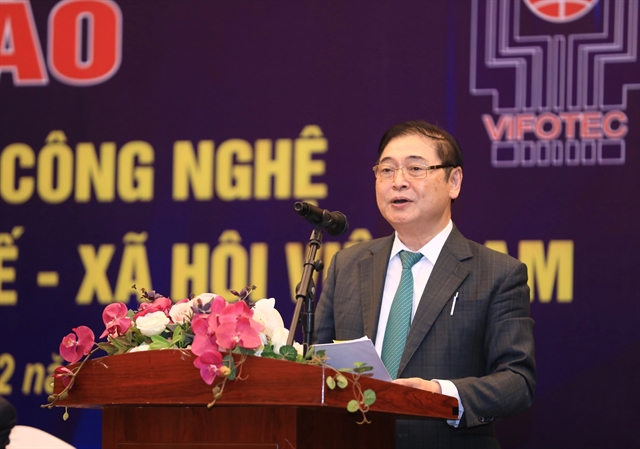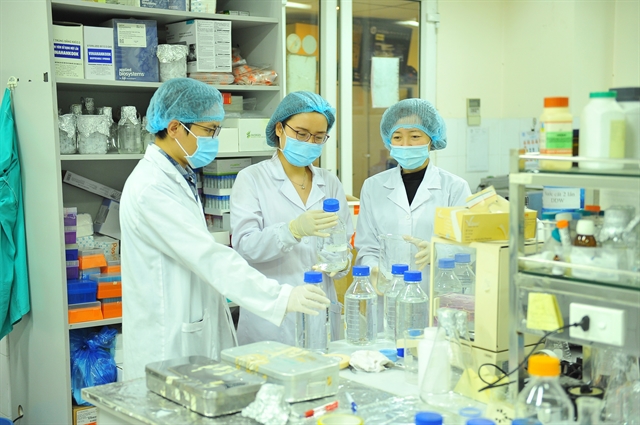.jfif) Opinion
Opinion

 |
| Dr Phan Xuân Dũng, chairman of the Vietnam Union of Science and Technology Associations (VUSTA). — VNA/VNS Photo |
According to Dr Phan Xuân Dũng, chairman of the Vietnam Union of Science and Technology Associations (VUSTA), investing in talent was the most profitable investment, so it is critical to have a strategy for identifying, attracting, and nurturing talent. He spoke with the Vietnam News Agency about the contributions of the intellectual community in the past 15 years since the 10th Party Central Committee issued Resolution No.27-NQ/TW on building a strong intellectual community and proposed solutions to further strengthen the intellectual community in the future.
How do you assess the current position and role of the intellectual community and the efforts to build this community for the sustainable development of the country?
Resolution 27 was adopted at the 10th Party Central Committee on August 6, 2008, when Việt Nam was entering a period of industrialisation and modernisation with the Party and the State's principles of developing the country based on science and technology. The development of science and technology became a top national policy, playing a pivotal role in the socio-economic development of the country.
Over the past 15 years, under the leadership of the Party and State, based on Resolution 27, the National Assembly and the Government have issued many legal documents and laws that focus on fundamental solutions such as creating a working environment for intellectuals, valuing and honouring them, making essential changes in human resource training, and defining the roles and responsibilities of intellectuals.
As a result, the stature of our country has been steadily elevated, as stated by Party General Secretary Nguyễn Phú Trọng at the 13th Party Congress: "Our country has never had such resources, potential, international position, and prestige as it does today."
What measures has VUSTA, as a Party’s political and social organisation, implemented to leverage the role of intellectuals in consultation, criticism, social appraisal, and contributing to making science and technology a driving force for the country's development?
In its role of uniting and gathering scientists and leading experts in their respective fields, VUSTA has focused on consultancy, criticism, and social appraisal activities, which are the core activities of VUSTA.
In recent years, VUSTA has intensified its consultancy and criticism efforts, focusing on providing feedback on draft political reports, drafts of socio-economic development strategies, science and technology, education and training, environmental protection, healthcare, and some important draft laws and major investment projects, as well as addressing pressing issues requiring the involvement of scientific and technological experts.
In addition, VUSTA at the local level has conducted research, proposals, consultancy, and criticism with departments and industries in various forms for local projects of socio-economic development, security and defence.
Although VUSTA has achieved many positive results in consultancy, criticism, and social appraisal, it still faces some challenges in implementing its tasks, such as units not proactively requesting consultancy, criticism, and social appraisal due to the absence of a mandatory mechanism.
Most of the projects that VUSTA conducts are proposed by VUSTA itself. The number of programmes and projects in which VUSTA has conducted in recent times has not been high, so the allocated budget for consultancy and criticism activities has not been fully utilised, and eventually refunded.
I believe that to make consultancy, criticism, and social appraisal work effectively, the immediate solution is to create conditions for intellectuals’ activities. It is essential to determine the structure and fields for VUSTA to establish suitable organisations in line with the Party and State's guidelines.
Furthermore, using appropriate methods to gather leading experts in various fields, both within and outside VUSTA's system and establishing a database of experts, and selecting and recommending experts with the necessary competence and qualifications for each consultancy, criticism, and social appraisal task are necessary.
If these solutions are implemented effectively, VUSTA's consultancy, criticism, and social appraisal activities conducted by the intellectual community will increasingly meet the requirements of the Party and the State.
 |
| Scientists work on the SARS-CoV-2 virus at a lab at the National Institute of Hygiene and Epidemiology in Hà Nội. — VNA/VNS Photo Minh Đức |
How do you assess the challenges and requirements for the task of building an intellectual community in the near future?
After 15 years of implementing Resolution 27, the Vietnamese intellectual community has made significant progress in terms of quantity and quality in all fields. However, alongside these achievements, there are some limitations and shortcomings in the activities of the scientific and technological intellectual community.
The contributions of the scientific and technological intellectual community to the country's development have not met expectations. There is still a shortage of leading experts, and there is a gap in the succession of expertise.
Meanwhile, the mechanisms and policies for attracting talent are still inadequate and lack coherence, with limited innovative elements. Scientists often receive low salaries that do not match their scientific and technological contributions. The incentives for the intellectual community and scientists to dedicate themselves to the nation are still lacking.
Furthermore, investment in science and technology remains low and the creative capacity of scientists has not been fully realised. Preferential policies for leading scientists and those in charge of national-level missions do not adequately meet their demands. Scientists have not truly been honoured, affecting their self-esteem and passion for scientific work.
Developing the intellectual community requires a concentrated investment in science and technology, as this is a top national policy and a driving force for the country's development and innovation. The Party and the State need to show even greater respect for intellectuals and leading scientists.
The Party and State should have breakthrough policies regarding talent and the intellectual community. Investing in talent is the most profitable investment, so there should be a strategy for identifying, attracting, and nurturing talent. Strong incentive policies should be in place to encourage the intellectual community to dedicate their talents and enthusiasm to the nation's development and safeguarding the homeland in this new era of development.
In your opinion, what should we do to further enhance the role of intellectuals?
After more than 35 years of renewal, the Party has led the effective role of the worker-farmer-intellectual alliance in building and safeguarding the country. Every achievement of the country owes much to the workers, farmers, and the intellectual community. This alliance has been intertwined and mutually beneficial, fostering each other's development. The alliance needs mechanisms and policies to create a legal framework and ensure a harmonious balance of interests among all parties involved, especially the interests of businesses and farmers.
To make the alliance more sustainable, it is essential to harmonise the fundamental interests of various classes, and the entire nation in all sectors. In the current context, specific measures are needed to attract investment in the field of science and technology for this alliance to grow and become even more cohesive. — VNS




